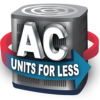Factors to Consider:
-
Sustainability:
- Energy Efficiency: Look for high SEER (Seasonal Energy Efficiency Ratio) for cooling and AFUE (Annual Fuel Utilization Efficiency) for heating. Both Goodman and other brands offer high-efficiency models.
- Low Global Warming Potential (GWP) Refrigerants: Goodman uses environmentally friendly refrigerants, as do many other major brands.
- Renewable Energy Integration: Consider systems compatible with solar panels or other renewable energy sources for long-term sustainability. Not all Goodman models offer this directly, but they may be compatible with third-party solutions.
-
Performance and Features:
- Climate Suitability: Ensure the chosen system aligns with your local climate. Goodman offers heat pumps for various climates, but research their suitability for your specific zone.
- Comfort and Noise Levels: Evaluate features like variable-speed operation and noise reduction technology for enhanced comfort. Research features available in both Goodman and other brands.
- Smart Home Integration: If you prioritize smart home connectivity, ensure compatibility with your existing system or future plans. Both Goodman and other brands offer smart-enabled models.
-
Cost and Value:
- Upfront Cost: Compare Goodman's pricing with other brands, considering installation and long-term operating costs. Remember, higher initial costs might translate to energy savings later.
- Rebates and Incentives: Check for government or utility rebates available for energy-efficient systems, regardless of brand.
- Warranties and Service: Evaluate warranty coverage and service availability offered by Goodman compared to other brands.


